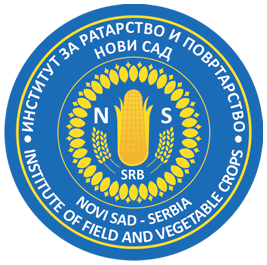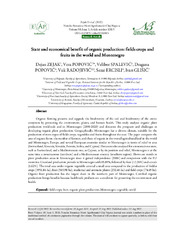Prikaz osnovnih podataka o dokumentu
State and economical benefit of organic production: fields crops and fruits in the world and Montenegro
| dc.creator | Zejak, Dejan | |
| dc.creator | Popović, Vera | |
| dc.creator | Spalević, Velibor | |
| dc.creator | Popović, Dragana | |
| dc.creator | Radojević, Vuk | |
| dc.creator | Ercisli, Sezai | |
| dc.creator | Glišić, Ivan | |
| dc.date.accessioned | 2022-08-30T08:27:52Z | |
| dc.date.available | 2022-08-30T08:27:52Z | |
| dc.date.issued | 2022 | |
| dc.identifier.issn | 0255-965X | |
| dc.identifier.issn | 1842-4309 | |
| dc.identifier.uri | http://fiver.ifvcns.rs/handle/123456789/3082 | |
| dc.description.abstract | Organic farming preserve and upgrade the biodiversity of the soil and biodiversity of the entire ecosystem by protecting the environment, plants, and human health. This study analyses organic plant production worldwide and in Montenegro (2000-2020) and discusses the prospects and challenges in developing organic plant production. Geographically, Montenegro has a diverse climate, suitable for the production of more types of fields crops, vegetables and fruits throughout the year. The paper compares the area of organic farms, the number of farmers, and share of organic in the overall agricultural land in the world and Montenegro, Europe, and several European countries similar to Montenegro in terms of relief or area (Switzerland, Slovenia, Slovakia, Estonia, Serbia, and Cyprus). Data were also analysed for a mountainous state, such as Switzerland, and a Mediterranean one, as Cyprus, as by its position and relief, Montenegro is at the same time a mountainous (northern) and a Mediterranean country (southern region). Shows are trends in plant production areas in Montenegro since it gained independence (2006) and comparison with the EU countries. Grassland production prevails in Montenegro with 85.89%, followed by fruit (12.26%) and cereals (1.62%). The total area under organic vegetable covered a small area compared to the production of fodder crops (3951.84 ha), fruit (563.98 ha), medicinal and aromatic plants (232.46 ha) and field crops (74.49 ha). Organic fruit production has the largest share in the northern part of Montenegro. Certified organic production brings benefits because health-safe products are a condition for preserving the environment and health. | sr |
| dc.language.iso | en | sr |
| dc.publisher | Cluj-Napoca : AcademicPres | sr |
| dc.relation | info:eu-repo/grantAgreement/MESTD/inst-2020/200032/RS// | sr |
| dc.relation | APV Project 2022-2023: Analysis of the impact of nitrogen on the productivity of maize hybrids of different FAO maturity groups using classical and modern technology | sr |
| dc.rights | openAccess | sr |
| dc.rights.uri | https://creativecommons.org/licenses/by/4.0/ | |
| dc.source | Notulae Botanicae Horti Agrobotanici Cluj-Napoca | sr |
| dc.subject | field crops | sr |
| dc.subject | fruit | sr |
| dc.subject | organic farming | sr |
| dc.subject | organic plant production | sr |
| dc.subject | Montenegro | sr |
| dc.subject | vegetables | sr |
| dc.subject | world | sr |
| dc.title | State and economical benefit of organic production: fields crops and fruits in the world and Montenegro | sr |
| dc.type | article | sr |
| dc.rights.license | BY | sr |
| dc.citation.issue | 3 | |
| dc.citation.rank | M22 | |
| dc.citation.spage | 12815 | |
| dc.citation.volume | 50 | |
| dc.identifier.doi | 10.15835/nbha50312815 | |
| dc.identifier.fulltext | http://fiver.ifvcns.rs/bitstream/id/8553/12815+NBHA+Zejak+2022.08.25.pdf | |
| dc.identifier.scopus | 2-s2.0-85138768803 | |
| dc.type.version | publishedVersion | sr |


